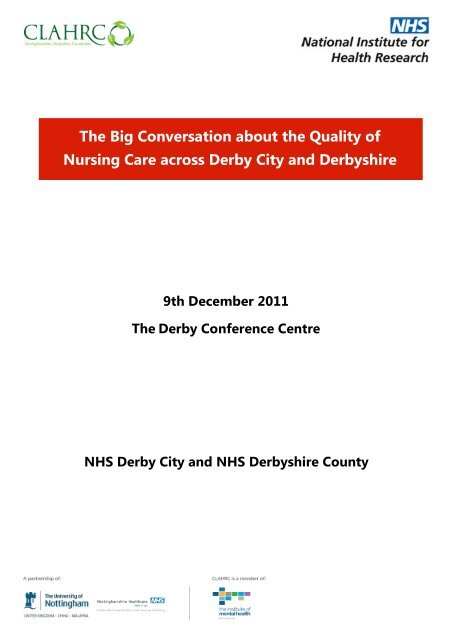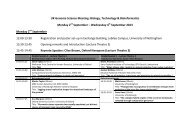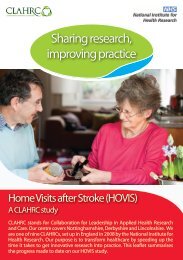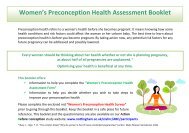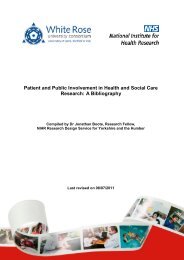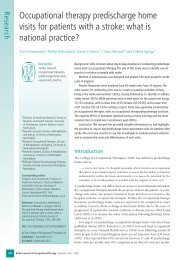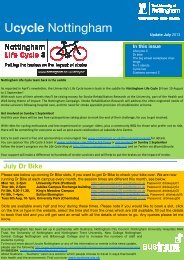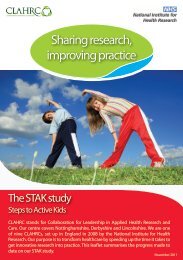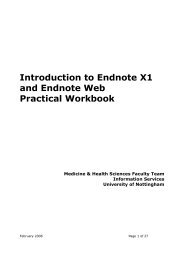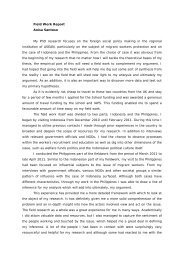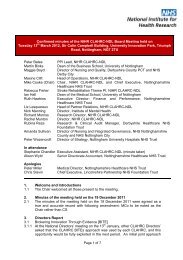The Big Conversation about the Quality of Nursing ... - CLAHRC-NDL
The Big Conversation about the Quality of Nursing ... - CLAHRC-NDL
The Big Conversation about the Quality of Nursing ... - CLAHRC-NDL
You also want an ePaper? Increase the reach of your titles
YUMPU automatically turns print PDFs into web optimized ePapers that Google loves.
<strong>The</strong> <strong>Big</strong> <strong>Conversation</strong> Tit <strong>about</strong> <strong>the</strong> <strong>Quality</strong> <strong>of</strong><br />
<strong>Nursing</strong> Care across Derby City and Derbyshire<br />
Derby City and Derbyshire<br />
9th December 2011<br />
<strong>The</strong> Derby Conference Centre<br />
NHS Derby City and NHS Derbyshire County
Forward<br />
Recently, <strong>the</strong> quality <strong>of</strong> nursing care in health and social care has attracted much<br />
media attention and has been a shocking reminder to patients, carers and<br />
pr<strong>of</strong>essionals <strong>of</strong> <strong>the</strong> impact <strong>of</strong> poor pr<strong>of</strong>essional practice, poor leadership and<br />
unhealthy cultures. As with Castlebeck, sometimes it is just cruel individuals inflicting<br />
harm and using <strong>the</strong>ir power on vulnerable patients.<br />
It is disappointing that excellent nursing practice is not systematically applied across<br />
health and social care and that inconsistencies exist. <strong>The</strong>se inconsistencies impact<br />
greatly on patients and families and cause much stress and anxiety.<br />
NHS Derbyshire and Derby City consider improving <strong>the</strong> patient experience for residents<br />
as a key priority. At first, it is important to understand what are <strong>the</strong> patients’ stories and<br />
experiences, what are <strong>the</strong> challenges facing staff, how can we improve care and<br />
where is <strong>the</strong> patient’s voice in our planning and delivery <strong>of</strong> services. While we<br />
recognise that <strong>the</strong>re is excellent care, this is not consistently delivered. Patients are our<br />
biggest resource but in <strong>the</strong> recent past we have not recognised that working closely<br />
with us can bring <strong>about</strong> real change that is sustainable. It is <strong>of</strong>ten small actions that<br />
make a significant difference. Thus, our shift in thinking and approach commenced<br />
with an event to listen to views and opinions from staff and patient groups – <strong>The</strong> <strong>Big</strong><br />
<strong>Conversation</strong>. This is <strong>the</strong> first step on a journey to promote improvements in ‘care’<br />
across Derbyshire.<br />
I hope you find <strong>the</strong> report <strong>of</strong> interest as it captures <strong>the</strong> stories and <strong>the</strong>mes from <strong>the</strong><br />
day. It is <strong>the</strong> start <strong>of</strong> our journey to make sure <strong>the</strong> patient’s voice is heard through <strong>the</strong><br />
health reforms.<br />
I would like to thank my Director colleagues for <strong>the</strong>ir leadership and Bridget Roe for her<br />
attention on <strong>the</strong> day to capture <strong>the</strong> obvious - and not so obvious - to write <strong>the</strong> report.<br />
Any feedback or ideas are welcome.<br />
Maggie<br />
Director <strong>of</strong> Clinical <strong>Quality</strong> &<strong>Nursing</strong><br />
NHS Derbyshire County PCT<br />
2
About <strong>the</strong> author<br />
Bridget Roe is a doctoral researcher at Nottingham University Business School/<strong>CLAHRC</strong>-<strong>NDL</strong>.<br />
She has 22 years‟ experience as a nurse, midwife and care home manager and has worked in<br />
<strong>the</strong> charity sector as a project leader. After gaining a BA in Human Resource Management and<br />
an MA in Management and Organisational Analysis at Warwick Business School, Bridget is<br />
currently researching <strong>the</strong> learning and socialisation <strong>of</strong> novice nurses in <strong>the</strong> context <strong>of</strong> current<br />
policy and practice.<br />
<strong>The</strong> Directors <strong>of</strong> <strong>Nursing</strong><br />
Maggie Boyd is Director <strong>of</strong> Clinical <strong>Quality</strong> and <strong>Nursing</strong> for NHS Derbyshire County PCT. She<br />
has 30 years‟ experience as a nurse, midwife and Health Visitor with clinical experience in acute<br />
surgery, accident and emergency, occupational health, midwifery, health visiting and public<br />
health development work. Maggie‟s first leadership role was as King‟s Fund clinical leader <strong>of</strong> a<br />
health visiting team in a socially deprived area with chronic staff shortages. Senior roles have<br />
included primary care development in a London Health Authority, NHS Executive Director roles<br />
since 2000 within NHS Trust Community Provider, Workforce Confederation, SHA and since<br />
2006 in Derbyshire PCT. Maggie is a Florence Nightingale Scholar 2011/12, a member <strong>of</strong> <strong>the</strong><br />
<strong>Nursing</strong> Times editorial team and also a clinical fellow from Derby.<br />
Kath Henderson joined Derbyshire Community Health Services as Director <strong>of</strong> <strong>Quality</strong> and<br />
Chief Nurse in June 2011. She is a qualified nurse and has worked within <strong>the</strong> NHS since starting<br />
her nursing career in 1977. She has worked in a variety <strong>of</strong> roles and organisations including <strong>the</strong><br />
acute sector, an integrated NHS Trust (acute, community and mental health services), a<br />
specialist children‟s NHS Trust, NHS Direct and a Primary Care Trust. Prior to moving to DCHS<br />
Kath was <strong>the</strong> Managing Director and Chief Nurse for Ro<strong>the</strong>rham Community Health Services. In<br />
addition to her nursing qualifications Kath has a MSc in Health Economics and Management.<br />
Kath is a Trustee at Bluebell Wood Children‟s Hospice. She is married and has three daughters.<br />
Paul Lumsdon is Director <strong>of</strong> <strong>Nursing</strong> at Derbyshire Healthcare NHS Foundation Trust. He has<br />
worked within <strong>the</strong> NHS for 26 years and is very proud <strong>of</strong> <strong>the</strong> nurse training he received in<br />
Macclesfield. Since qualifying, Paul has gained clinical experience in a broad range <strong>of</strong> mental<br />
health services including Child and Adolescent Services, Adult <strong>of</strong> Working Age and Older<br />
Peoples Services working in areas such as Cheshire, Derbyshire, South Wales and Dorset. Paul<br />
has gained management experience in various setting within primary care, community care,<br />
district general as well as mental health services. Prior to joining <strong>the</strong> Trust, Paul had been<br />
working as Nurse Executive for 14 years<br />
3
Brigid Stacey joined <strong>the</strong> Royal Derby Foundation Trust in August 2010 as Director <strong>of</strong> Patient<br />
Experience and Chief Nurse. Previously she was <strong>the</strong> Chief Operating Officer/Nurse Director at<br />
Walsall Hospitals NHS Trust where she became Deputy Chief Executive.<br />
Alfonzo Tramontano is Chief Nurse at Chesterfield Royal Hospital NHS Foundation Trust. As<br />
General Manager <strong>of</strong> <strong>the</strong> Surgical Directorate Alfonzo oversaw <strong>the</strong> early hitting <strong>of</strong> <strong>the</strong> 18-week<br />
target, helping introduce <strong>the</strong> one matron per in-patient ward through his a „hands on‟<br />
approach.<br />
Presenters<br />
Dame Elizabeth Fradd is an independent health service adviser. <strong>The</strong> focus <strong>of</strong> her work and<br />
abiding passion is <strong>the</strong> continuous improvement <strong>of</strong> health care. She was until April 2004 <strong>the</strong><br />
Nurse Director and lead Director for <strong>the</strong> Review and Inspection programme in <strong>the</strong> Commission<br />
for Health Improvement (CHI) and prior to this Assistant Chief Nurse in <strong>the</strong> Department <strong>of</strong><br />
Health. Her current portfolio <strong>of</strong> work includes commissioned independent Inquiries /<br />
investigations, <strong>the</strong> delivery <strong>of</strong> innovative pr<strong>of</strong>essional development programmes and <strong>the</strong><br />
mentoring <strong>of</strong> senior personnel.<br />
Mark Todd was Member <strong>of</strong> Parliament for South Derbyshire between 1997 and his retirement<br />
from <strong>the</strong> seat in 2010. He served on <strong>the</strong> Treasury Select Committee through <strong>the</strong> banking crisis<br />
scrutinising <strong>the</strong> work <strong>of</strong> ministers, finance sector leaders and <strong>the</strong> Bank <strong>of</strong> England. Before his<br />
parliamentary career he worked for 20 years in <strong>the</strong> Pearson Group leaving as UK Operations<br />
Director for Addison Wesley Longman (<strong>the</strong>n one <strong>of</strong> <strong>the</strong> largest education publishers in <strong>the</strong><br />
world). Since leaving Parliament he has been successively Chair <strong>of</strong> NHS Derby City and <strong>of</strong> <strong>the</strong><br />
Derbyshire Cluster <strong>of</strong> PCTs. He is also Chair <strong>of</strong> Trustees <strong>of</strong> <strong>the</strong> Motor Neurone Disease<br />
Association which provides care support to those living with <strong>the</strong> disease, campaigns on <strong>the</strong>ir<br />
behalf and funds research into <strong>the</strong> disease. He lives just outside Derby.<br />
Stephanie Austin is Head <strong>of</strong> Clinical <strong>Quality</strong> at NHS Derby City. Steph set up <strong>the</strong> local COPD<br />
service in 2003 which she led for 6 years. She also has clinical experience in a variety <strong>of</strong> settings<br />
including primary care, acute care and in <strong>the</strong> pharmaceutical industry.<br />
Hayley Veal is <strong>the</strong> Head <strong>of</strong> Clinical <strong>Quality</strong> within NHS Derbyshire County. She works closely<br />
with care homes, <strong>the</strong> local authority and <strong>the</strong> Care <strong>Quality</strong> Commission to quality assure<br />
independent providers within <strong>the</strong> care home sector in order to drive up <strong>the</strong> quality <strong>of</strong> care<br />
received by residents.<br />
Gaynor Ward is a Nurse Consultant in Learning Disabilities and Mental Health at Derbyshire<br />
Healthcare Foundation Trust. She provides expert nursing practice, clinical leadership and<br />
consultancy to <strong>the</strong> learning disability service, within <strong>the</strong> sphere <strong>of</strong> mental health.<br />
4
Acknowledgements<br />
<strong>The</strong> author is grateful to everyone who helped with this report, including all those who<br />
contributed to <strong>the</strong> „<strong>Big</strong> <strong>Conversation</strong>‟ meeting in December 2011.<br />
5
Table <strong>of</strong> Contents<br />
Executive Summary…………………………………………………………………………………………………………………………..4<br />
Background………………………………………………………………………………………………………………………………….4<br />
<strong>The</strong> Tabletop Discussions…………………………………………………………………………………………………………….5<br />
<strong>The</strong> <strong>The</strong>mes………………………………………………………………………………………..………………………………….……7<br />
Feedback……………………………………………………………………………………………………………………………........10<br />
Action Learning Points……………………………………..…………………………………………………………………...10<br />
<strong>The</strong> Report <strong>of</strong> <strong>the</strong> Day’s Proceedings……………………………………..………………………………………………...…….12<br />
Plenary: Dame Elizabeth Fradd………………………………..………………………………………………………..….…..13<br />
<strong>Conversation</strong> 1: What are we getting right?.................................................................................16<br />
<strong>Conversation</strong> 2: When and how are we letting out patients down?............................................17<br />
<strong>Conversation</strong> 3: What is needed and how will we know we are giving good care consistently….17<br />
Plenary……………………………………………………………………………………………………………………………………..…….19<br />
6
Executive Summary<br />
Background<br />
This meeting took place as a response to <strong>the</strong> collective desire <strong>of</strong> nursing to open up <strong>the</strong><br />
conversation <strong>about</strong> nursing care, to reinforce patient experience as a key strand <strong>of</strong> reform and<br />
discuss what a shared vision for <strong>the</strong> future might look like.<br />
<strong>The</strong> conversation was to take place between a broad range <strong>of</strong> people including frontline<br />
nurses, patient consultation groups and primary and acute and mental health care providers to<br />
encourage a collaborative approach to maintaining good pr<strong>of</strong>essional standards and<br />
improving care for patients. <strong>The</strong>refore, it was hoped that <strong>the</strong> event could also inform providers<br />
<strong>about</strong> what <strong>the</strong> patient experience might be at best, and what were <strong>the</strong> hopes and predictions<br />
for <strong>the</strong> future. <strong>The</strong> day also had a strong leadership focus supported by <strong>the</strong> East Midlands<br />
Leadership Academy and <strong>CLAHRC</strong>-<strong>NDL</strong>. This report is prepared by Bridget Roe on behalf <strong>of</strong> <strong>the</strong><br />
<strong>CLAHRC</strong> <strong>NDL</strong>.<br />
<strong>The</strong>re were 68 attendees from a range <strong>of</strong> organizations including NHS Trusts, GP Surgeries,<br />
patient groups, care homes, academic institutions and <strong>the</strong> third sector. Most attended held<br />
senior roles; only a minority <strong>of</strong> delegates (around 6) were „front-line‟ staff. <strong>The</strong>re were 47<br />
people in ei<strong>the</strong>r a management or senior role (including directors, matrons, and a chief<br />
executive), 9 in an academic/media role, 9 RGNs below matron/consultant level and 4 patient<br />
representatives. <strong>The</strong> attendance was <strong>the</strong>refore heavily weighted to those with senior roles in<br />
services.<br />
<strong>The</strong> day began with introductions from Mark Todd, Chair <strong>of</strong> NHS Derby City and NHS<br />
Derbyshire County Cluster and Maggie Boyd, Executive Director <strong>of</strong> Clinical <strong>Quality</strong> and<br />
<strong>Nursing</strong>. This was followed by a keynote address on best practice by Dame Elizabeth Fradd,<br />
board facilitated table top discussions between delegates, and a plenary session that focused<br />
on examples <strong>of</strong> good practice and <strong>the</strong> areas <strong>of</strong> concern. Finally, <strong>the</strong>re was a series <strong>of</strong><br />
presentations from <strong>the</strong> Directors <strong>of</strong> <strong>Nursing</strong> and <strong>the</strong>ir teams followed by questions.<br />
7
<strong>The</strong> Table Top Discussions<br />
Delegates were allocated tables so that people were distributed and each table was facilitated<br />
by a member <strong>of</strong> <strong>the</strong> Board or from East Midlands Leadership Academy. <strong>The</strong> tables were asked<br />
to engage with:<br />
1. What is good practice, what are we getting right?<br />
2. When and how are we letting our patients down?<br />
3. What is needed and how will we know we are delivering good quality care consistently?<br />
Delegates were firstly asked, “What are we getting right?”. Although <strong>the</strong> conversations started<br />
with thoughts <strong>about</strong> good practice, tables soon slipped into conversations <strong>about</strong> poor practice.<br />
One group noted, “We are not good at blowing our own trumpet and it‟s hard because <strong>the</strong>re is<br />
no point <strong>of</strong> reference”. <strong>The</strong> conversations recognised that intentions are usually good which<br />
should be appreciated, however practitioners are reticent <strong>about</strong> celebrating what <strong>the</strong>y do well.<br />
Good practice should be celebrated and talent should be spotted at whatever level. Nurses are<br />
good at listening and big thoughts need to be retained and shared.<br />
When considering „how we are letting our patients down‟ and „what is needed and how will we<br />
know we are delivering good care‟, a number <strong>of</strong> issues were discussed. <strong>The</strong>se included<br />
organisational culture, <strong>the</strong> impact <strong>of</strong> time, problems <strong>of</strong> communication between different<br />
services and a lack <strong>of</strong> staff. Delegates wanted a „no blame‟ culture, however, <strong>the</strong>y also<br />
highlighted <strong>the</strong> stigma <strong>of</strong> mentioning a shortage <strong>of</strong> nurses; it was seen to be regarded as „an<br />
old chestnut‟. An honest discussion was <strong>of</strong>ten not had for fear <strong>of</strong> reprisal amidst a highly<br />
political context. <strong>The</strong> lack <strong>of</strong> ownership over patient care was highlighted and it was<br />
considered important to find evidence that <strong>the</strong>re were problems, <strong>the</strong>re is a need to sharpen up<br />
thinking but <strong>the</strong>re are concerns that this may „kill‟ <strong>the</strong> Darzi principles. It was noted that nurses<br />
can and do expose poor practice, however, communication needs to be improved to make this<br />
more effective. Delegates also talked <strong>about</strong> <strong>the</strong> need for good leadership and clinical<br />
supervision to support exposing poor practice.<br />
Groups used stories to help understand each o<strong>the</strong>r‟s perspectives and recognise how poor<br />
practice is manifest. It was noted that <strong>the</strong> understanding <strong>of</strong> culture <strong>of</strong>ten comes from intuition<br />
- a gut feeling. This is not problematic if used against indicators, but intuition still needs acting<br />
on. Nurses need patients to help <strong>the</strong>m to evaluate care, however, patients are not always able<br />
to recall details retrospectively. Members <strong>of</strong> Derbyshire LINk informed o<strong>the</strong>r delegates <strong>about</strong><br />
<strong>the</strong>ir model <strong>of</strong> partnership and successful visits to care homes and how this information was<br />
used by NHS Derby County. Delegates representing from LINk had brought patient feedback<br />
8
which were complimented by groups swapping real life stories with each o<strong>the</strong>r and considering<br />
what it must feel like to be a patient. It was suggested that we are dominated by targets and<br />
numbers and forget people. A return to patient/nurse thinking was called for ra<strong>the</strong>r than just<br />
thinking <strong>about</strong> <strong>the</strong> process. It was suggested that stories should be used in meetings with<br />
business managers to help <strong>the</strong>m to understand <strong>the</strong> anomalies in <strong>the</strong> service and processes.<br />
<strong>The</strong> problem <strong>of</strong> understanding different „languages‟ between roles was recognized, however,<br />
so much so, that things <strong>of</strong>ten need spelling out. This was recognised to be part <strong>of</strong> <strong>the</strong>” game<br />
we play”. It was also suggested that issues could be <strong>the</strong>med or to think <strong>about</strong> <strong>the</strong> internal and<br />
external factors that influence nursing care.<br />
Following <strong>the</strong> plenary, several key points emerged. <strong>The</strong>se included a welcome <strong>of</strong> <strong>the</strong> patient<br />
focus (putting <strong>the</strong>ir patients first), to get <strong>the</strong> basics right and encourage a just, fair and „no<br />
blame culture‟ where nurses care for each o<strong>the</strong>r and celebrate success. Communication was<br />
considered to be central to providing excellent care and managing expectations and education<br />
and training should be at all levels, including <strong>the</strong> Board. <strong>The</strong>re was also a strong recognition<br />
that <strong>the</strong>re needs to be more collaborative working and sharing <strong>of</strong> good practice and systems,<br />
and we should all ask what we would want for our own VIPs. Story telling dominated <strong>the</strong><br />
conversations at <strong>the</strong> tables.<br />
9
<strong>The</strong> <strong>The</strong>mes<br />
<strong>The</strong> following five <strong>the</strong>mes are drawn from both <strong>the</strong> guided and informal conversations, <strong>the</strong><br />
invited speaker‟s suggestions on post-it notes, evaluation forms and this author‟s observations.<br />
1. Sharing Practice<br />
2. Improving Communication<br />
3. Integration <strong>of</strong> Approach/Transformation to 24 hour seamless high quality care<br />
4. Patients First - getting <strong>the</strong> basics right<br />
5. Training, Valuing and Motivating <strong>the</strong> Workforce.<br />
Sharing Practice<br />
An overriding <strong>the</strong>me <strong>of</strong> <strong>the</strong> day was a desire to share best practice, however <strong>the</strong>re was also a<br />
wish to understand each o<strong>the</strong>r‟s services better and move towards working more<br />
collaboratively to improve standards <strong>of</strong> care.<br />
For example, delegates suggested a need for “cross pollination” and “drip-feeding good ideas<br />
and practice”. Never<strong>the</strong>less, as Dame Elizabeth Fradd noted, nurses are not always good at<br />
talking <strong>about</strong> what <strong>the</strong>y do well and although <strong>the</strong>re are pockets <strong>of</strong> sharing good practice, it is<br />
<strong>of</strong>ten difficult to do. Many delegates tried to think <strong>of</strong> ways in which this could be achieved, for<br />
example <strong>the</strong> use <strong>of</strong> forums and notice boards was suggested. <strong>The</strong>re were also calls for a more<br />
systematic approach and opportunities to share across organisations, both in Derbyshire and<br />
nationally. As one person noted, we need change “across <strong>the</strong> whole system” and as ano<strong>the</strong>r<br />
wrote, <strong>the</strong>re is a need to “work with voluntary, private sectors etc to find solution, we could be<br />
a „critical friend‟. This would include not only sharing <strong>the</strong> good ideas, innovations and big<br />
successes, but also best practice and actions from day-to-day working and incidents. Delegates<br />
called for <strong>the</strong> chance to observe practice increasing “access to knowledge” and acknowledging<br />
<strong>the</strong> role <strong>of</strong> patients in this process. <strong>The</strong>re was however, an understanding that „Best Practice‟<br />
does not necessarily work from context to context. It was recognised that resources, support<br />
and space is required for evaluation and time is needed to see if <strong>the</strong> change works,<br />
summarised through comments such as “give change a chance”.<br />
Improving Communication<br />
<strong>The</strong> need to improve communication was a strong <strong>the</strong>me throughout <strong>the</strong> day, seen in both <strong>the</strong><br />
conversations and <strong>the</strong> post-it notes. Many delegates expressed that <strong>the</strong>y wanted a more open<br />
(we are not expert in everything) and honest conversation with colleagues and patients, and as<br />
10
someone noted, develop an “NHS Speak”. This fits with some comments from <strong>the</strong> table top<br />
discussions, where people stated that <strong>the</strong>y did not have a common language for<br />
understanding each o<strong>the</strong>r‟s practices. <strong>The</strong>re is a desire for good communication to cross <strong>the</strong><br />
hierarchies and for patients and staff to be heard. <strong>The</strong>re is a need to listen to front-line staff.<br />
However <strong>the</strong> problems <strong>of</strong> communicating difficult messages between nurses and senior<br />
managers were noted and it was suggested that „Front Line Friday‟ should be done by all.<br />
A clearer understanding <strong>of</strong> each o<strong>the</strong>r‟s roles was considered to be paramount for integrated<br />
care, and although listening was seen as important, people also expressed <strong>the</strong> view that<br />
responsive action should closely follow what was heard, <strong>the</strong>refore avoiding „lip-service‟. In<br />
particular, it was felt that patients should be listened to, that this is at <strong>the</strong> heart <strong>of</strong> a patient<br />
centered approach and could save valuable time and resources. It would also help to guide<br />
patient‟s expectations from <strong>the</strong> start (remembering outcomes are not just medical), possibly by<br />
have a „contract <strong>of</strong> expectation‟ but also to avoid information overload as it could cloud <strong>the</strong><br />
issues at stake. It was suggested that in particular, communication with vulnerable people<br />
should be considered and supported by appropriate safeguarding frameworks to „give <strong>the</strong>m a<br />
voice‟. <strong>The</strong> use <strong>of</strong> nominated individuals for all service users was advocated. <strong>The</strong> building <strong>of</strong><br />
effective relationships, for example, between higher education and service was suggested so<br />
that “nurses <strong>of</strong> <strong>the</strong> future reflect <strong>the</strong> values and beliefs, skills and competencies that were<br />
discussed today”.<br />
Integration <strong>of</strong> approach / transformation to 24 hour seamless high quality care<br />
Integrated thinking and service provision (linked to <strong>the</strong> recognition that <strong>the</strong>re is a lack <strong>of</strong><br />
understanding <strong>of</strong> each o<strong>the</strong>r‟s practice areas) was ano<strong>the</strong>r important <strong>the</strong>me. <strong>The</strong>re was a call<br />
for 24/7 care, a more seamless service and to develop and to improve <strong>the</strong> culture, 24 hours a<br />
day to give a consistent approach and to think beyond 8am to 6:30pm, Monday to Friday.<br />
Again, <strong>the</strong>re was <strong>the</strong> recognition that to integrate thinking and services, <strong>the</strong>re needs to be<br />
more opportunity to exchange ideas and share experience and knowledge with o<strong>the</strong>r service<br />
and each o<strong>the</strong>r.<br />
Patients First - Getting <strong>the</strong> Basics Right<br />
Dame Elizabeth Fradd reminded delegates that we need to “find <strong>the</strong> person inside <strong>the</strong> patient”<br />
and put <strong>the</strong> patient first. Getting <strong>the</strong> basics right was a key concern <strong>of</strong> <strong>the</strong> delegates. <strong>The</strong>re is a<br />
need to focus services on all users, but increasingly on <strong>the</strong> elderly, those with learning<br />
disabilities and <strong>the</strong> vulnerable. Questions were raised as to how to recognise if we are caring<br />
for <strong>the</strong> most vulnerable. Timeliness was discussed, and ideas such as collecting information<br />
11
early to allow rapid pathway implementation and planning for discharge early were suggested.<br />
A “Patient Centric Record” was suggested. <strong>The</strong> importance <strong>of</strong> focusing on <strong>the</strong> ordinary and<br />
getting <strong>the</strong> „little things‟ right, was seen as vital. Both <strong>the</strong> speakers and <strong>the</strong> delegates discussed<br />
<strong>the</strong> challenges <strong>of</strong> changing targets and <strong>the</strong> current financial situation. Not enough is learnt<br />
following incidents and <strong>the</strong>re is a desire for more timely action. Involving patients in key<br />
decision making was urged, and delegates were shown exemplars from o<strong>the</strong>r areas such as<br />
Kings College‟s initiative “How are we doing?”<br />
Training, Valuing and Motivating <strong>the</strong> Workforce<br />
It was suggested that Derbyshire could become <strong>the</strong> “Beacon <strong>of</strong> Excellent Patient Care”. Staff<br />
needed space to create, be innovative but also to fail. Leadership and role modeling is needed<br />
from all levels <strong>of</strong> employees. It was also suggested that <strong>the</strong>re be better healthcare worker<br />
training in areas such as dementia. A comment on a post-it note described how „we are letting<br />
our nurses down and <strong>the</strong>refore <strong>the</strong> patients; we should have realistic expectations from staff‟.<br />
Delegates were reminded that <strong>the</strong> „good‟ is rarely reported in <strong>the</strong> media and celebrating<br />
success is not easy, as “we are not good at blowing our own trumpet”. <strong>The</strong> chance to talk<br />
<strong>about</strong> similar challenges whilst acknowledging <strong>the</strong> common desire to provide good quality<br />
patient care was valued.<br />
12
Feedback<br />
Around 50% <strong>of</strong> delegates filled in feedback forms and <strong>the</strong> majority <strong>of</strong> delegates agreed that<br />
<strong>the</strong>ir understanding <strong>of</strong> <strong>the</strong> national and local leadership agenda has increased and were clearer<br />
<strong>about</strong> <strong>the</strong>ir personal leadership and development needs. <strong>The</strong> delegates were also confident<br />
and committed that <strong>the</strong>y could use what <strong>the</strong>y had learnt in <strong>the</strong>ir own Trust and valued <strong>the</strong><br />
chance for interaction and networking, engaging in genuine conversations from work settings<br />
trying to tackle similar challenges. <strong>The</strong> lack <strong>of</strong> attendance from frontline staff was noted. Whilst<br />
<strong>the</strong> examples <strong>of</strong> best practice and good clinical leadership provided inspiration for delegates,<br />
some remarked that <strong>the</strong>re were too many speakers just after lunch. It was suggested that<br />
instead, <strong>the</strong> open conversations should be had during this time. Delegates also expressed a<br />
wish for more time to have <strong>the</strong> open table conversations across <strong>the</strong> tables.<br />
This was a new and unique event. Early informal conversations indicated that <strong>the</strong> majority <strong>of</strong><br />
delegates were genuinely enthusiastic and wanted to engage with <strong>the</strong> aims <strong>of</strong> <strong>the</strong> day, to be<br />
able to voice opinions freely and exchange ideas. Delegates had <strong>the</strong> chance to network and<br />
meet with like-minded o<strong>the</strong>rs and this was later regarded as one <strong>of</strong> <strong>the</strong> key benefits <strong>of</strong> <strong>the</strong> day.<br />
In addition to <strong>the</strong> guided discussions, <strong>the</strong>se informal conversations over c<strong>of</strong>fee and lunch<br />
supported <strong>the</strong> exchange <strong>of</strong> ideas and shared experiences.<br />
Action learning Points<br />
<strong>The</strong> use <strong>of</strong> storytelling to illustrate points was a strong feature <strong>of</strong> <strong>the</strong> conversations, however,<br />
<strong>the</strong>re were indications that some delegates still did not feel that this was a safe forum. At<br />
future events <strong>the</strong>re could be an even stronger emphasis that delegates have permission to be<br />
honest and express <strong>the</strong>ir opinions and tell stories without a concern <strong>about</strong> negative<br />
consequences.<br />
<strong>The</strong>re were different styles <strong>of</strong> facilitating <strong>the</strong> table top discussions which demonstrated<br />
different skill sets. <strong>The</strong> conversations appeared to be more productive when <strong>the</strong> facilitator was<br />
able to spend most <strong>of</strong> <strong>the</strong> time listening and where where people in <strong>the</strong> groups had <strong>the</strong> space<br />
to seek clarification from each o<strong>the</strong>r (which <strong>of</strong>ten corrected misunderstandings <strong>about</strong> each<br />
o<strong>the</strong>r‟s services) and build up rapport and trust with new colleagues. This shows a need for<br />
good listening skills and taking <strong>the</strong> pace <strong>of</strong> <strong>the</strong> event down in order to cultivate <strong>the</strong><br />
conversations.<br />
13
At future events many delegates would prefer <strong>the</strong> conversations to take place in <strong>the</strong> afternoon<br />
with more time allocated to <strong>the</strong> open discussions. At this event, people were still trying to<br />
capture <strong>the</strong> issues and had just gained momentum when time was called. Although delegates<br />
were interested in this meetings afternoon talks it was felt <strong>the</strong>re were too many and too much<br />
emphasis on existing best practice which does not always transfer to different contexts. Future<br />
events <strong>the</strong>refore may needs to be redesigned to allow more conversations between delegates<br />
to take place.<br />
Key areas to consider may include:<br />
Developing leadership<br />
How to share best practice, <strong>the</strong> use <strong>of</strong> websites and communities <strong>of</strong> practice to enable<br />
sharing and learning<br />
Job „swaps‟ to understand each o<strong>the</strong>r‟s areas<br />
<strong>The</strong> importance <strong>of</strong> critical reflective practice<br />
Good models <strong>of</strong> supervision, mentorship, preceptorship.<br />
<strong>The</strong> importance <strong>of</strong> storytelling<br />
How to hear <strong>the</strong> key voice <strong>of</strong> frontline staff<br />
Promoting a culture <strong>of</strong> innovation and support<br />
<strong>The</strong> overriding evaluation is that <strong>the</strong> event was very positive through nurses being heard,<br />
having some honest, genuine and open dialogue and positively engaging with like-minded<br />
people. <strong>The</strong> event gave delegates <strong>the</strong> inspiration and confidence to consider how to take<br />
things forward and influence o<strong>the</strong>rs, and <strong>the</strong>re was a sense <strong>of</strong> <strong>the</strong> event being an opportunity<br />
that gave nurses hope for <strong>the</strong> future. <strong>The</strong> next steps will be a launch <strong>of</strong> a <strong>Nursing</strong> Cabinet to<br />
oversee <strong>the</strong> ongoing improvements and bring <strong>the</strong> strategic priorities into a nursing strategy<br />
to facilitate change where <strong>the</strong> patient voice is heard in a way that is meaningful at every level.<br />
14
Report <strong>of</strong> <strong>the</strong> Day’s proceedings<br />
<strong>The</strong>re was a wide spread <strong>of</strong> people from a range <strong>of</strong> healthcare, institutional and third sector<br />
settings. <strong>The</strong> majority <strong>of</strong> attendees had a senior role in <strong>the</strong> provision <strong>of</strong> care. <strong>The</strong>re were 47<br />
people in ei<strong>the</strong>r a management or senior role (including directors, matrons, a chief executive),<br />
9 in an academic/media role, 9 RGN‟s below matron/consultant level and 4 patient<br />
representatives. <strong>The</strong> attendance was <strong>the</strong>refore heavily weighted to those with senior roles in<br />
services.<br />
Opening remarks: Maggie Boyd- Director <strong>of</strong> <strong>Nursing</strong> and Clinical <strong>Quality</strong><br />
Maggie Boyd opened <strong>the</strong> proceedings, and expressed her hope that <strong>the</strong> day would be a great<br />
opportunity to help <strong>the</strong> sector to move forward, that <strong>the</strong>re would be plenty <strong>of</strong> opportunity for<br />
a decent, relaxed conversation, that delegates would feel able to express <strong>the</strong>mselves and that<br />
<strong>the</strong> focus would be towards service users.<br />
Mark Todd- Chair <strong>of</strong> NHS Derby City and NHS Derbyshire County Cluster<br />
Mark Todd discussed care from a board perspective, and drew on:<br />
1. <strong>The</strong> timeliness <strong>of</strong> <strong>the</strong> event amidst <strong>the</strong> current concerns <strong>of</strong> quality in NHS and Social<br />
Care. He spoke <strong>about</strong> <strong>the</strong> importance <strong>of</strong> defining what quality means, and described<br />
how it is increasingly defined by <strong>the</strong> patient and carers experience. Never<strong>the</strong>less, he<br />
argued that <strong>the</strong>re is a need to understand, collect and assimilate patient perceptions<br />
<strong>about</strong> care.<br />
2. Integration <strong>of</strong> <strong>the</strong> organisation <strong>of</strong> care, including how to organise a seamless service,<br />
and <strong>the</strong> challenge <strong>of</strong> working this out.<br />
3. Governance - defining how we know what we are doing is right, and what evidence is<br />
required. <strong>The</strong> delegates heard how we need a range <strong>of</strong> information sources, and to<br />
define <strong>the</strong> tools we need.<br />
4. Transformation. <strong>The</strong> challenge is <strong>the</strong> reduction <strong>of</strong> costs, whilst also ensuring that<br />
patients are protected and quality <strong>of</strong> care is enhanced. This should be possible through<br />
transformation but it raises issues <strong>of</strong> understanding <strong>the</strong> potential impact <strong>of</strong> having to<br />
confront <strong>the</strong> crisis.<br />
5. Context. Not only an aging population but also increasing expectations. Stoicism is<br />
now changing to rightly higher expectations <strong>of</strong> good quality <strong>of</strong> care.<br />
15
Plenary: Dame Elizabeth Fradd - University <strong>of</strong> Nottingham<br />
Dame Elizabeth Fradd spoke <strong>about</strong> <strong>the</strong> issue as one <strong>of</strong> <strong>the</strong> need to balance pr<strong>of</strong>essional and<br />
corporate responsibility to provide best practice, to understand <strong>the</strong> relevance <strong>of</strong> <strong>the</strong>se care<br />
issues to your service and role and <strong>the</strong> part individuals play in safeguarding and experience.<br />
Four areas <strong>of</strong> concern were highlighted: failure to communicate, pain relief, assistance to <strong>the</strong><br />
toilet and adequate nutrition and hydration. Dame Elizabeth Fradd argued that <strong>the</strong>re were no<br />
surprises in <strong>the</strong> reports from <strong>the</strong> Mid Staffordshire and CQC inquiries, and how “we don‟t know<br />
what a good service is until we don‟t get it”. <strong>The</strong> <strong>Big</strong> <strong>Conversation</strong> is <strong>about</strong> putting <strong>the</strong> jigsaw<br />
and hearts and minds toge<strong>the</strong>r. Culture is <strong>the</strong> most significant thing that makes a difference in<br />
failing to recognise concerns; it is never <strong>about</strong> one person, it is <strong>about</strong> systems and processes.<br />
Dame Elizabeth Fradd reminded everyone <strong>of</strong> <strong>the</strong> NHS survey which shows a clear link between<br />
good HR practice and high staff engagement. <strong>The</strong>re is new research based in looking at<br />
adverse events in 12 countries and <strong>the</strong>y have been linked to a poor working environment.<br />
Everybody has a responsibility; it‟s always bigger than one person.<br />
Dame Elizabeth Fradd summarised <strong>the</strong> common findings in recent reviews <strong>of</strong> care:<br />
General Findings<br />
1. <strong>The</strong>re are many very dedicated staff<br />
2. <strong>The</strong>re are always pockets <strong>of</strong> good practice (but <strong>of</strong>ten not shared)<br />
3. <strong>The</strong> majority <strong>of</strong> service users get good care but not all<br />
4. <strong>The</strong>re have been too many reconfigurations and restructures; an eye has been taken <strong>of</strong>f<br />
<strong>the</strong> patient experience<br />
5. Too much emphasis has been placed on targets and <strong>the</strong> financial position<br />
6. <strong>The</strong> existence <strong>of</strong> too many committees clouds <strong>the</strong> line <strong>of</strong> decision making<br />
7. <strong>The</strong> culture <strong>of</strong> <strong>the</strong> NHS determines <strong>the</strong> outcome<br />
8. Insufficient emphasis has been placed on safety and quality. <strong>Quality</strong> can be hard to<br />
report but improving with <strong>the</strong> introduction <strong>of</strong> KPI‟s. <strong>The</strong> „circle‟ has <strong>of</strong>ten not been<br />
reported after an audit, and <strong>the</strong>re aren‟t enough lessons learnt or shared. Dame<br />
Elizabeth Fradd asked people to think <strong>about</strong> what <strong>the</strong>y can remember from <strong>the</strong> last<br />
audit.<br />
9. <strong>The</strong>re has been insufficient involvement <strong>of</strong> patients in key decision making/service<br />
design/policy, are you feeding <strong>the</strong> audit back to <strong>the</strong> patient? Dame Fradd informed<br />
delegates <strong>of</strong> <strong>the</strong> King‟s College Hospital exemplar<br />
10. <strong>The</strong>re has been inadequate staffing levels and inadequate leadership in some areas <strong>of</strong><br />
health<br />
16
11. Variable quality <strong>of</strong> monitoring/audit. <strong>The</strong>re are too many action plans, diluting <strong>the</strong><br />
focus.<br />
12. Risk management processes are immature, with little understanding <strong>of</strong> how this gets<br />
fed into <strong>the</strong> framework or what <strong>the</strong> priorities are.<br />
13. Boards <strong>of</strong>ten not aware <strong>of</strong> <strong>the</strong> frontline reality. Exemplar: Whipps Cross “In your Shoes”<br />
Clinical Findings<br />
1. <strong>The</strong> Importance <strong>of</strong> good Clinical leadership.<br />
2. Communication and thresholds for sharing.<br />
3. Team Working- What is it? Who is involved?<br />
4. Issues <strong>of</strong> training/updating, <strong>the</strong>re is <strong>of</strong>ten confusion with supervision.<br />
5. Use <strong>of</strong> policies, important to use intranet as paper copies can be out <strong>of</strong> date (St<br />
George‟s problem)but how? <strong>The</strong> way <strong>the</strong> intranet is navigated is <strong>of</strong>ten changed which<br />
makes it difficult to locate policies and procedures and o<strong>the</strong>r resources.<br />
6. <strong>The</strong> patient is not seen as an individual; we need to find <strong>the</strong> person inside <strong>the</strong> patient,<br />
as a family member and a person in <strong>the</strong> community.<br />
7. “Good service is giving customers a little more than <strong>the</strong>y expect”- it‟s <strong>the</strong> little things.<br />
<strong>The</strong> White paper “Equity and Excellence- Liberating <strong>the</strong> NHS” matches closely to what we know<br />
<strong>about</strong> <strong>the</strong> expectations <strong>of</strong> patients - compassionate, dignified, respectful and individualised<br />
care. Delegates were reminded <strong>of</strong> <strong>the</strong> NMC code and accountability and that <strong>the</strong>y must be<br />
able to justify <strong>the</strong> decisions that you make and consider:<br />
<br />
<br />
<br />
How do you know?<br />
How do you assure yourself? (not ensure or reassure)<br />
How can you be certain that you are not immune to poor care?<br />
It was noted that people <strong>of</strong>ten do become immune to what <strong>the</strong>y see going on. <strong>The</strong>refore we<br />
must consider responsibility, how certain can nurses be when <strong>the</strong>y delegate and what tools are<br />
<strong>the</strong>y using to determine adequate staffing levels. It‟s <strong>about</strong> raising concerns, incident reporting,<br />
whistle-blowing and communicating with pr<strong>of</strong>essional bodies, but this is very hard to do.<br />
Dame Elizabeth Fradd told delegates <strong>about</strong> <strong>the</strong> new GMC guidance which will hopefully<br />
provide reassurance. It defines management, getting things done through and with people,<br />
and <strong>the</strong> need to create an environment in which people can perform appropriately.<br />
Management roles involve teams but all individuals have a duty <strong>of</strong> care.<br />
17
<strong>The</strong> delegates were told <strong>of</strong> <strong>the</strong> 7 Principles <strong>of</strong> Public Office. This is relevant to all healthcare<br />
managers. It was acknowledged that it is hard for middle managers, who are accountable to<br />
both management and <strong>the</strong> pr<strong>of</strong>ession, and <strong>the</strong>re is a conflict between operational and<br />
pr<strong>of</strong>essional practice and <strong>the</strong>y <strong>of</strong>ten become risk averse. It comes down to leadership again.<br />
Passing problems upwards is hard, particularly when it is not good news. <strong>The</strong> absence <strong>of</strong><br />
curiosity is a big issue.<br />
<strong>The</strong> audience heard how we face challenging times: <strong>the</strong> economic downturn, challenges <strong>of</strong><br />
regulation, uncertainty in new government policy and difficultly in working across agencies.<br />
However, <strong>the</strong> real concern is identifying who can speak out on behalf <strong>of</strong> <strong>the</strong> patient. <strong>The</strong> power<br />
<strong>of</strong> <strong>the</strong> chief nurse is diminishing. What is needed is <strong>the</strong> management <strong>of</strong> <strong>the</strong> expectations <strong>of</strong><br />
patients, carers, commissioners and regulators. Care needs to flexible and cost effective (such<br />
as <strong>the</strong> productive ward, and lean strategies), <strong>the</strong> organisational reputation must be good and<br />
<strong>the</strong> potential <strong>of</strong> <strong>the</strong> staff and service should be maximised. Leaders need to be empowered<br />
and secure a personal reputation. DameElizabeth Fradd highlighted <strong>the</strong> exemplar <strong>of</strong> Honda<br />
and <strong>the</strong> Power <strong>of</strong> Dreams http://dreams.honda.com. This shows us that staff in care need space<br />
to be creative and innovative. <strong>The</strong>re are lessons to be learnt from <strong>the</strong> Improvement Project<br />
from <strong>the</strong> Department <strong>of</strong> Improvement and Innovation. It‟s <strong>of</strong>ten <strong>the</strong> small things that matter,<br />
<strong>the</strong> relevant things need to be selected and success should be celebrated.<br />
To conclude, Dame Elizabeth Fradd talked <strong>of</strong> <strong>the</strong> need to recognise failure and that everybody<br />
has a responsibility for patient care. Patient and public feedback is vital, do something <strong>about</strong> it<br />
and be seen to do something <strong>about</strong> it. <strong>The</strong> care environment is complex and any action is not<br />
easy but have a go and don‟t give up.<br />
Questions<br />
1. Delegate: What <strong>about</strong> <strong>the</strong> influence <strong>of</strong> external factors on nursing? A nurse may not<br />
understand all <strong>the</strong> agenda, you get encouragement but <strong>the</strong>n your ideas get dropped.<br />
Maybe you need to know how to recognise what you are not asking? People can<br />
misinterpret support. When policy moves on, nurses need a safety net.<br />
DEF: This is at <strong>the</strong> heart <strong>of</strong> what people experience. Supervision needs to be improved,<br />
people need someone to talk things through with. To understand <strong>the</strong> core business,<br />
appreciate <strong>the</strong> ripple effect <strong>of</strong> death etc, we are still learning. <strong>The</strong> RCN Political Leadership<br />
Programme is useful guidance for nurses.<br />
18
2. Delegate: Are things worse?<br />
DEF: no, not worse. Healthcare has got better and it is now in <strong>the</strong> public domain. <strong>The</strong><br />
doctor used to be God and <strong>the</strong> nurse was <strong>the</strong> angel. <strong>The</strong>re has also been a huge amount<br />
<strong>of</strong> misreporting and nurses are an easy target. Good practice is never reported.<br />
3. Service User: How can you train a nurse to be a bit more emotional? How can you guide<br />
<strong>the</strong> pr<strong>of</strong>ession?<br />
DEF: <strong>The</strong> heart <strong>of</strong> <strong>the</strong> issue is in education for nurses. Anyone who does not feel should<br />
not be a nurse, we need careful selection. But nurses can behave unemotionally that<br />
supports people humanely as it helps deliver care. Good role modelling is important. EF<br />
learnt from working as a nanny for Glenda Jackson who had such humility; good leaders<br />
show humility, it is not <strong>about</strong> formal teaching.<br />
4. Delegate: I work in education and you can‟t teach compassion but you can teach self-<br />
awareness and how to sense.<br />
DEF: Yes, it‟s <strong>about</strong> being guided, supervision, reflection.<br />
<strong>Conversation</strong> 1: What are we getting right?<br />
Examples<br />
<br />
<br />
<br />
<br />
<br />
<br />
<br />
<br />
<br />
<br />
Intentions are good and need recognising.<br />
Often people feel <strong>the</strong>y can‟t complain <strong>about</strong> medical care because it‟s seen to be good.<br />
We should bring in real life stories <strong>about</strong> differing perceptions.<br />
People are good at listening.<br />
Communication is not as good as it could be, misunderstandings happen but how to<br />
capture this?<br />
People described leadership initiatives, a chief nurse spoke <strong>about</strong> changing times,<br />
listening to frontline staff that have <strong>the</strong> good ideas.<br />
<strong>The</strong> importance <strong>of</strong> clinical supervision, recognising when <strong>the</strong>y are needed.<br />
Having a big thought and being able to hold it.<br />
We are good at exposing poor practice and being vocal. A table considered <strong>the</strong><br />
difficulties in talking <strong>about</strong> <strong>the</strong> good.<br />
Patients are more important than benchmarks<br />
19
When we look at <strong>the</strong> negatives we have to look at <strong>the</strong> culture.<br />
We are too shy <strong>about</strong> celebrating <strong>the</strong> good.<br />
A member <strong>of</strong> this group described <strong>the</strong>ir work in learning disability as “second to none”<br />
but that <strong>the</strong>y don‟t get enough compliments<br />
A table included patient representatives from <strong>the</strong> LINKS. <strong>The</strong>y talked <strong>about</strong> models <strong>of</strong><br />
partnership and <strong>the</strong>ir visits to care homes which worked very well, was well received, and had a<br />
great outcome. <strong>The</strong> Information was used by <strong>the</strong> NHS Derby County. <strong>The</strong>y talked <strong>about</strong> <strong>the</strong><br />
need for witnesses and to be reactive. <strong>The</strong>y hold c<strong>of</strong>fee mornings where people can talk freely.<br />
Delegates were story-telling and talked <strong>of</strong> <strong>the</strong> need not to understate <strong>the</strong> good things, and<br />
that we need a platform for raised expectations. In <strong>the</strong> mental health field, pr<strong>of</strong>essionals can<br />
visit groups go to where <strong>the</strong> patients are and try to understand <strong>the</strong> real issues.<br />
<strong>Conversation</strong> 2: When and how are we letting our patients down?<br />
<strong>Conversation</strong> 3: What is needed and how will we know we are delivering good<br />
quality care consistently?<br />
Examples <strong>of</strong> conversations summarised toge<strong>the</strong>r<br />
It was thought to be critical that in care we have an open, no blame culture, maintain open<br />
attitudes however some delegates can we even to this today? Some people thought yes but<br />
o<strong>the</strong>rs thought no. One person was very concerned and said its different when you have to<br />
answer to everybody, when you do speak you have to be corporate. <strong>The</strong> problems are similar<br />
in every area and we “need <strong>the</strong> truth <strong>of</strong> <strong>the</strong> matter”. It was thought that not enough nurses was<br />
considered „an old chestnut‟ and that culture „shouldn‟t be mentioned‟.<br />
Time was considered to be a key issue in terms <strong>of</strong> providing high quality care but again, it was<br />
a big taboo. <strong>The</strong> new language <strong>of</strong> lean was perceived to be useful, but it was recognised that<br />
<strong>the</strong>re are not enough bodies, especially with <strong>the</strong> impact <strong>of</strong> <strong>the</strong> aging population, in order to<br />
provide good quality care. Recognition <strong>of</strong> <strong>the</strong> need for proper discussion was stated, but this<br />
was deemed impossible because <strong>of</strong> QIPP, economics and politics and <strong>the</strong> fear <strong>of</strong> reprisal.<br />
Moreover, whilst <strong>the</strong> need to look at <strong>the</strong> basics was recognised, <strong>the</strong>re was little certainty <strong>about</strong><br />
what is needed, what opportunities could be taken, and how could <strong>the</strong> focus be shifted. <strong>The</strong><br />
problem <strong>of</strong> mental health and accountability issues in acute settings was highlighted. People<br />
20
<strong>of</strong>ten do not take responsibility and need to acknowledge <strong>the</strong> limitations and clear up<br />
misunderstandings between different areas.<br />
It was highlighted that we need evidence to show that things are not in place. <strong>The</strong>re is lack <strong>of</strong><br />
ownership; we need to explore what prompts good care, and put time-frames on care as it can<br />
go on for too long. We should sharpen up our thinking, and avoid silos but also consider <strong>the</strong><br />
impact on <strong>the</strong> patient at <strong>the</strong> same time. However, does sharpening up thinking „kill‟ <strong>the</strong> Darzi<br />
principles?<br />
What can we do from a service user perspective to make <strong>the</strong>ir lives less stressful? One<br />
suggestion was to try to avoid admission in <strong>the</strong> first place, promote best practice in <strong>the</strong><br />
community. It was considered that we need people that understand both systems and use to<br />
care pathways that translate into people‟s everyday thinking.<br />
One key area that should be looked at was thought to be admission and discharge, and <strong>the</strong>re<br />
was potential here to change <strong>the</strong> processes to improve care. Discharge planning needs to start<br />
even before patients go in to hospital, for example, start thinking <strong>about</strong> pain relief and so on,<br />
however this requires a huge amount <strong>of</strong> communication, a culture shift and to think<br />
proactively. Think <strong>about</strong> long term chronic conditions, <strong>the</strong> transferability <strong>of</strong> an approach, <strong>the</strong><br />
key principles should be <strong>the</strong> same. Learn from patients who talk <strong>about</strong> <strong>the</strong> reality <strong>of</strong> <strong>the</strong>ir<br />
discharge with personal budgets. People should be named in discharge packages so <strong>the</strong>y can<br />
be identified if needed. We let people down by asking repeated questions, <strong>the</strong>re has got to be<br />
a better way than tick boxes; one person said “I blame <strong>the</strong> managers”.<br />
21
Plenary<br />
Delegates were reminded that <strong>the</strong> event was <strong>about</strong> engagement and a need to „bottle up‟ <strong>the</strong>ir<br />
approach. Even if one ward is „cracked‟ <strong>the</strong> approach doesn‟t transfer, it‟s <strong>about</strong> making it<br />
known and understanding how to share best practice and which forums to use for doing so.<br />
Practice doesn‟t necessarily transfer, but talking to each o<strong>the</strong>r helps, asking for <strong>the</strong> reality in<br />
practice, sharing <strong>the</strong> bad and <strong>the</strong> good. It‟s similar to <strong>the</strong> end <strong>of</strong> a project, reflecting so people<br />
can see <strong>the</strong> process. Patients also need to understand <strong>the</strong> process and <strong>the</strong>n it isn‟t so stressful.<br />
A key issue is helping and empowering each o<strong>the</strong>r and being aware that change isn‟t for its<br />
own sake. During this session <strong>the</strong> board answered questions and at times it was only a 2 way<br />
discussion and not enough space for debate across <strong>the</strong> tables.<br />
Key Points<br />
<br />
<br />
<br />
<br />
<br />
<br />
<br />
<br />
<br />
Work collaboratively<br />
Get <strong>the</strong> basics right<br />
Manage expectations, some systems don‟t fit with modern life<br />
Give change a chance<br />
Don‟t give up on a bad idea<br />
Everything involves communication<br />
Understanding different systems and <strong>the</strong>refore expectations<br />
We need continuous improvement, communities <strong>of</strong> practice<br />
We find it hard to share, if we can crack this <strong>the</strong>n it would be really good.<br />
<strong>The</strong> board were asked <strong>about</strong> <strong>the</strong> future and what „spin‟ would be put onto care. Delegates<br />
were told we must learn from ideas such as AQP and not just implement blanket reform, for<br />
example as in Derbyshire Choices. We may have to change <strong>the</strong> way some people work, as <strong>the</strong><br />
hospital does not „wake-up‟ until 8:30am. Ano<strong>the</strong>r new idea is <strong>the</strong> elderly care pathway. <strong>The</strong><br />
board were asked how can we feed into this and delegates were told that we must get it right<br />
as we develop.<br />
<strong>The</strong> stress <strong>of</strong> <strong>the</strong> workload was highlighted which was linked to not achieving <strong>the</strong><br />
fundamentals and compromising <strong>the</strong> integrity <strong>of</strong> <strong>the</strong> nurse. It was asked, is <strong>the</strong> nurse going<br />
under? It was stated that we should monitor, measure and report <strong>the</strong> problem using nurse<br />
sensitive indicators.<br />
22
Delegates from learning disability teams informed delegates <strong>of</strong> <strong>the</strong> work <strong>the</strong>y had been doing<br />
and it was recommended that <strong>the</strong>y try to get publishes so that <strong>the</strong>ir best practice could move<br />
beyond Derbyshire.<br />
Key Points<br />
<br />
<br />
<br />
<br />
<br />
<br />
<br />
<br />
<br />
<br />
We need to care for each o<strong>the</strong>r<br />
We should celebrate success<br />
Be patient focused<br />
Continuous sharing <strong>of</strong> good practice<br />
No blame culture<br />
Positive learning environment (focus on organizational to value pr<strong>of</strong>essional<br />
requirements for<br />
PREP and clinical supervision)<br />
Nurse directors have a responsibility for variability in care but poor care is usually not<br />
deliberate<br />
We need a just and fair culture<br />
We should all ask would I want this for my VIP?<br />
Delegates were asked to save 3 points that were raised so it isn‟t just talking but also doing<br />
something <strong>about</strong> it.<br />
Examples <strong>of</strong> 3 learning points<br />
1. <strong>The</strong> patient experience is a welcome focus as <strong>the</strong> patient has <strong>of</strong>ten been unheard<br />
2. Focus on <strong>the</strong> ordinary, invest and empower HCA‟s<br />
3. Listen to <strong>the</strong> voice <strong>of</strong> <strong>the</strong> frontline nurse, ward to ward e.g. back to floor<br />
1. Clear focus on priorities<br />
2. Revisiting <strong>the</strong> basics, better access to care<br />
3. Education and training at board level.<br />
Dame Elizabeth Fradd asked <strong>the</strong> delegates to listen carefully to one ano<strong>the</strong>r, as <strong>the</strong>y were<br />
doing fantastic things. She urged <strong>the</strong>m to hold onto what <strong>the</strong>y are doing and what you know is<br />
good. She asked <strong>the</strong>m to put <strong>the</strong>ir heads above <strong>the</strong> parapet where needed and have a<br />
courageous discussion.<br />
23
After lunch, during which <strong>the</strong> issues continued to be discussed informally, delegates were<br />
shown <strong>the</strong> Panorama film <strong>about</strong> <strong>the</strong> abuse at <strong>the</strong> Castlebeck care home. This altered <strong>the</strong> mood<br />
<strong>of</strong> <strong>the</strong> delegates, although it was a stark reminder to everyone <strong>about</strong> what can happen when<br />
things go wrong. Following this, <strong>the</strong>re were 5 presentations that showcased best practice and<br />
ideas:<br />
<br />
<br />
<br />
<br />
Brigid Stacey, Derbyshire Hospitals Foundation Trust, “Leading for <strong>Quality</strong>”<br />
Gaynor Wars, Derbyshire Health Foundation Trust, “Access to mental health service<br />
made easier”<br />
Alfonzo Tramantano, Chesterfield Royal Hospital Foundation Trust, “Dignity in Care”<br />
Kath Henderson and colleagues, Derbyshire Community Health Services, Hayley Veal<br />
and Steph Austin, Heads <strong>of</strong> Clinical <strong>Quality</strong> (Commissioning) PCT cluster, “<strong>Quality</strong><br />
Assurance in care homes across Derbyshire”<br />
<strong>The</strong> delegates were <strong>the</strong>n asked to consider what next? It was hoped that <strong>the</strong> momentum<br />
would not be lost and that everyone could be ambassadors <strong>of</strong> <strong>the</strong> day. One member <strong>of</strong> a<br />
patient group noted that his vision would be that pr<strong>of</strong>essionals volunteered <strong>the</strong>ir „know how‟<br />
but that this had many constraints. It was asked how we can harness leadership capability<br />
across sectors. <strong>The</strong> passion, <strong>the</strong> energy and positivity in <strong>the</strong> room was acknowledged and<br />
delegates were reminded that <strong>the</strong>y all have a responsibility for improving and communicating<br />
ideas, which should be a top priority. Patients require integrated, seamless care but we also<br />
need to value staff and motivate <strong>the</strong> workforce. Pr<strong>of</strong>essor Guy Daly remarked that it was crucial<br />
for education and practice to collaborate, and work toge<strong>the</strong>r on good graduate programmes.<br />
24
About <strong>CLAHRC</strong>-<strong>NDL</strong><br />
<strong>The</strong> Collaboration for Leadership in Applied Health Research and Care – Nottinghamshire,<br />
Derbyshire and Lincolnshire (<strong>CLAHRC</strong>-<strong>NDL</strong>) is a partnership between <strong>the</strong> University <strong>of</strong><br />
Nottingham and NHS organisations across <strong>the</strong> region.<br />
It is one <strong>of</strong> nine <strong>CLAHRC</strong>s in England, and is funded by <strong>the</strong> National Institute for Health<br />
Research (NIHR).<br />
<strong>CLAHRC</strong>-<strong>NDL</strong> undertakes high quality, applied health and social care research and translates<br />
that research into practice; improving services for patients and service users across <strong>the</strong> East<br />
Midlands and beyond. Its core objective is to transform healthcare by speeding up <strong>the</strong> time it<br />
takes to get <strong>the</strong> findings from research into clinical practice.<br />
www.clahrc_ndl_nihr.ac.uk<br />
Disclaimer<br />
This report presents independent research commissioned by <strong>the</strong> National Institute for Health<br />
research (NIHR). <strong>The</strong> views expressed in this publication are those <strong>of</strong> <strong>the</strong> author(s) and not<br />
necessarily those <strong>of</strong> <strong>the</strong> NHS, <strong>the</strong> NIHR or <strong>the</strong> Department <strong>of</strong> Health<br />
25


